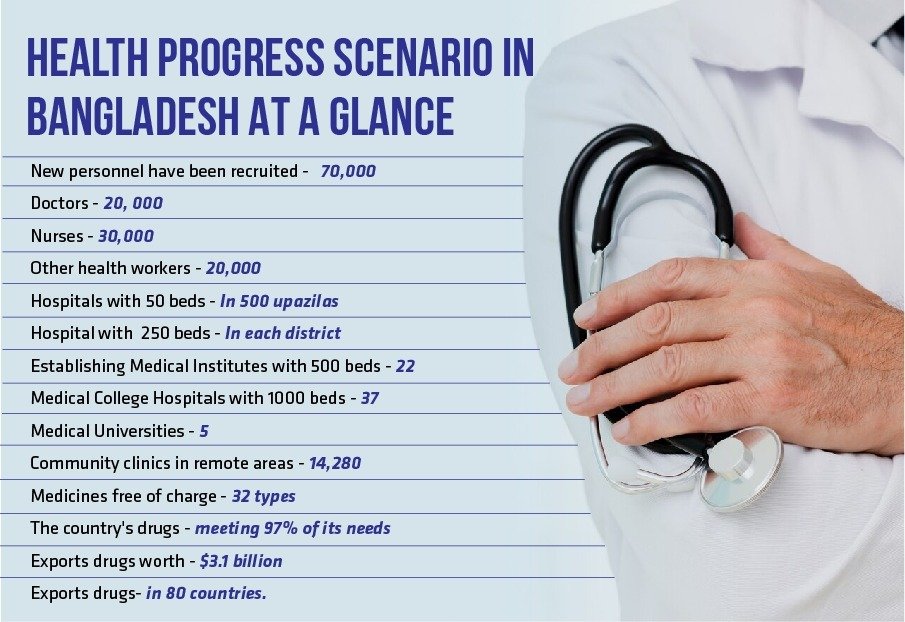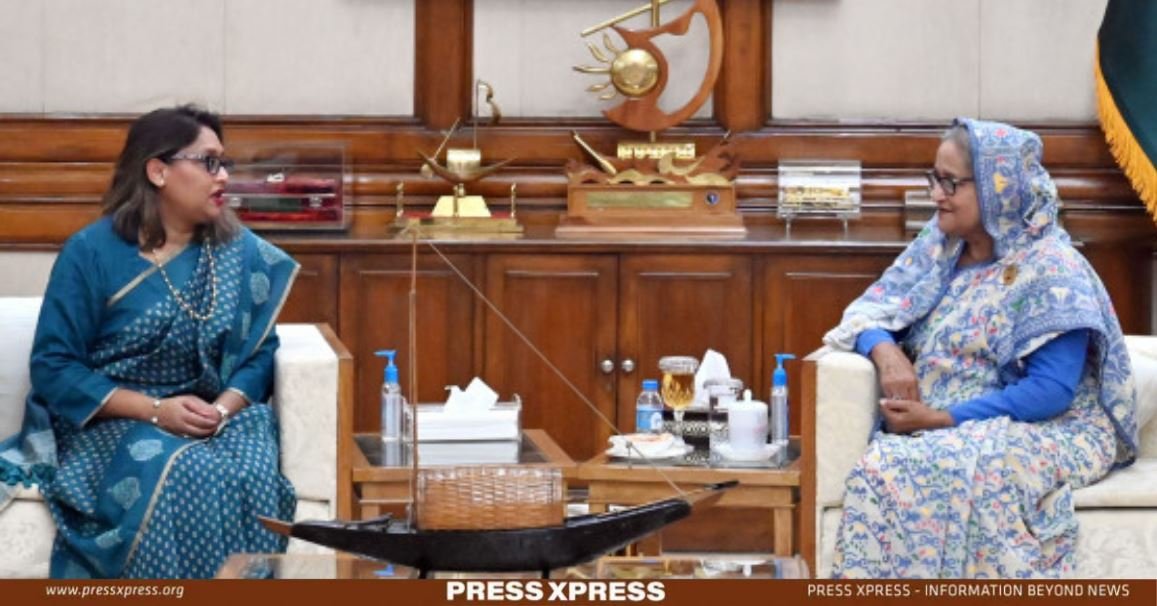WHO’s commitment to capacity building for healthcare professionals in Bangladesh, especially in climate-related diseases and mental health, reflects a crucial step towards fortifying the nation’s healthcare system
The World Health Organization (WHO) has expressed interest in aiding Bangladesh with capacity building for healthcare professionals. This initiative comes in response to Bangladesh’s vulnerability to climate change-induced health hazards and the imperative to fortify its healthcare system. WHO’s Regional Director for Southeast Asia, Saima Wazed, articulated this commitment during discussions (March 22, 2023) with Prime Minister Sheikh Hasina, underscoring the importance of capacity building for healthcare professionals.
You can also read: WHO Spearheads Change in Women’s Healthcare: Saima Wazed
The envisioned support encompasses multifaceted training programs targeting areas such as climate-related diseases, mental health, and tailored assistance for vulnerable groups like women, children, and individuals with disabilities. Against the backdrop of Bangladesh’s vulnerability to climate change, WHO’s intervention seeks to tackle health issues stemming from environmental challenges like air and sound pollution. This collaboration reflects a concerted effort to fortify Bangladesh’s healthcare landscape, equipping it to confront existing and emerging health threats while advancing the agenda of universal health coverage.
“The government recruited 25,000 doctors and 15,000 nurses on an emergency basis during the Covid-19 pandemic. The government is going to introduce a licensing examination for private health practitioners.”
– PM Sheikh Hasina

WHO’s Focus Areas:
The World Health Organization plans to address various concerns within Bangladesh, encompassing diseases linked to climate change, mental well-being, and aiding vulnerable demographics such as women, children, and individuals with disabilities, all in light of Bangladesh’s significant vulnerability to climate-related challenges.
Additionally, the WHO intends to assist Bangladesh in mitigating climate-induced illnesses, encompassing those stemming from air and noise pollution as well as rising temperatures. Furthermore, in the realm of mental health, the organization proposes integrating behavioral approaches into training programs, educational initiatives, and healthcare professional curricula.
Moreover, the World Health Organization aims to contribute to the advancement of universal health coverage in Bangladesh.
Integrated Health Hazards: Bangladesh
Integrated Health Hazards in Bangladesh are discussed below:
Bangladesh’s Climate Change-Related Diseases
In Bangladesh, climate change exacerbates health risks, fostering a breeding ground for diseases like malaria, dengue fever, and cholera. Rising temperatures and erratic rainfall patterns expand mosquito habitats, heightening the spread of vector-borne illnesses. Coastal regions face increased saline intrusion, amplifying waterborne diseases such as diarrhea and cholera. Floods, a frequent consequence of climate change, contaminate water sources, leading to widespread infections. Vulnerable populations, including children and the elderly, suffer disproportionately. Addressing climate change-induced diseases demands urgent action, from implementing resilient healthcare systems to promoting sustainable environmental practices, and safeguarding Bangladesh’s population against growing health threats.
Bangladesh’s Mental Health Diseases
In Bangladesh, mental health diseases like depression, anxiety, and PTSD are prevalent, exacerbated by poverty, natural disasters, and limited access to mental health services. The stigma surrounding mental illness often prevents individuals from seeking help, leading to untreated conditions. Government efforts to address mental health issues face challenges of resource scarcity and cultural barriers.
Interlinked Environmental Health Hazards
In Bangladesh, the convergence of air pollution, sound pollution, and rising temperatures precipitate numerous health challenges. Airborne contaminants exacerbate respiratory illnesses like asthma and bronchitis, while fine particulate matter increases cardiovascular risks. Sound pollution contributes to heightened stress levels and hearing impairments among urban dwellers. Meanwhile, escalating temperatures foster the proliferation of vector-borne diseases like dengue fever and malaria, facilitated by stagnant water in monsoon seasons. Additionally, heat-related ailments such as heatstroke and dehydration become more prevalent. These intertwined environmental factors pose a grave threat to public health in Bangladesh, demanding urgent mitigation strategies and sustainable development initiatives.
Bangladesh’s Health Sector Advancements
According to the Health and Family Welfare Ministry, significant advancements in Bangladesh’s healthcare sector over the past decade. Within the last three years, around 70,000 new personnel have been hired to improve healthcare quality, comprising 20,000 doctors, 30,000 nurses, and 20,000 other healthcare workers. Notably, during the COVID-19 pandemic, the government swiftly recruited 25,000 doctors and 15,000 nurses on an emergency basis.
Efforts to upgrade hospital services involved various initiatives, such as expanding 500 upazilas to accommodate modern hospitals with 50 beds each, enhancing district hospitals to 250 beds, establishing 22 medical institutes with 500 beds, 37 medical college hospitals with 1000 beds, and setting up five medical universities. Moreover, approximately 14,280 community clinics in remote areas offer 32 types of medicines free of charge, supported by approximately 50,000 healthcare providers.
In addition, 4,650 Union Health Care Centers provide complimentary medicine, consultations, and medical services in remote regions. The Health and Family Welfare Ministry emphasized the Ministry of Health’s successful measures in controlling the country’s population growth rate, resulting in a decline in the average number of children per married woman from 6.9 to two since independence.

Bangladesh earned the MDG award from the United Nations in 2010 for its outstanding achievements in reducing child and maternal mortality. The vaccination success rate surged from below 2% in 1984 to 92% in 2022. Presently, 92% of 12–13-year-old children are immune to tuberculosis, measles, polio, tetanus, and hepatitis, with the country fulfilling 97% of its pharmaceutical needs and exporting drugs worth $3.1 billion to approximately 80 countries.
Globally, Bangladesh has distinguished itself, ranking fifth worldwide and leading in South Asia in combating the COVID-19 pandemic. This success is credited to Prime Minister Sheikh Hasina’s timely and forward-thinking decisions, resulting in the vaccination of 90% of the target population with 37 crore doses provided free of charge. To address the pandemic’s impact, ICU beds increased from 578 to 2000, and central oxygen lines expanded from one to 120, effectively eradicating oxygen shortages in hospitals.
In conclusion, WHO’s commitment to capacity building for healthcare professionals in Bangladesh, especially in climate-related diseases and mental health, reflects a crucial step towards fortifying the nation’s healthcare system. This collaboration not only addresses immediate health threats but also advances the goal of universal health coverage, crucial for Bangladesh’s resilience against environmental challenges and emerging health risks.


